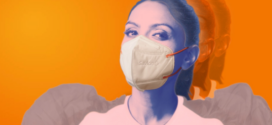How often do you get yourself checked for the right bra fit? Have or maybe never? Studies estimate that more than 80% of women are wearing the wrong bra size. A bigger cup size can be a misdiagnosed factor in changing your posture, which in turn may lead to musculoskeletal pain.
Wearing a bra all the time can potentially affect a person’s health in various ways, although the extent of these effects can vary from person to person. It’s important to note that scientific research on this topic is limited, and the following points are based on anecdotal evidence and clinical experience:
· Restricted Breathing: Chest expansion is compromised due to tight bras, which can make you a shallow breather
· Sagging: Lack of supportive help results in the stretching of the breast tissue causing a sag
· Circulation: A tight-fit bra is predicted to be a potential risk for cancer. As it restricts the lymphatic drainage of the breast tissues, it builds up on the metabolites around, posing an increased risk of cancer
· Psychological Effects: The discomfort and pressure of wearing a bra all day might also have psychological effects, contributing to stress and body image issues for some people
Link to breast reduction surgery:
Evidence shows there might be a connection between wearing a badly fitted bra and seeking breast reduction surgery. One of the studies done in 2003, showed a link between 102 females undergoing breast reduction surgery due to wearing the wrong bra size. Research shows, 70% of women wear a smaller bra cup size instead of their actual measurement.
How can going braless be a barrier?
The bra’s main function is to support the weight and structure of the breast and not only cosmetic appearance. Going braless can affect one’s posture and can cause sagging of the tissues, whereas, wearing a well-fitted bra, keeps them upright thereby boosting one’s look, self-esteem and confidence. Sports bra worn regularly can affect the ribcage by tightening it, thereby weakening back muscles and overstraining the breast ligaments. Nevertheless, during regular exercise it’s necessary to have some support else it would pose a risk to the internal breast tissues. If not worn during workouts, the upper back (trapezius), neck (levator scapulae) would have to work harder which can lead to neck spasms and cervicogenic headaches.
One should get assessed for the right size periodically because as we age, our sizes do keep changing which can be simply due to our weight change or physiological changes due to ageing. Opting for the right fit, especially correct cup size is essential. A tight-fitting bra, especially the shoulder straps can lead to tight neck and upper back muscles (Trapezius) which can cause neck pain and pain around the inner compartment of the shoulder blade in the upper back. Choose a bra which is more comfortable and avail its benefits rather than forgoing it. Sports bra can be considered as a better option as compared to a regular bra. In my experience, in most of the cases of unsettling chronic neck and upper back pain in female patients, a correction in bra fit helps reduce their nagging pain drastically.
Harms of wearing a bra that has an underwire:
The band of the bra provides 80% of the support to the breasts. It should ideally lie just underneath the tissues. A well-fitting band should sit straight across your back and be parallel to the ground. Underwires can compress the chest and hamper circulation and breathing to a great extent. It can also chafe the skin around.
To conclude, bra is not only for cosmetic appearance but immensely supports the overall well-being of a woman. It boosts the self-esteem, and mental health of the lady to a great extent.
Palak Dengla, Chief Physiotherapist, Aster RV Hospital
 Newspatrolling.com News cum Content Syndication Portal Online
Newspatrolling.com News cum Content Syndication Portal Online






